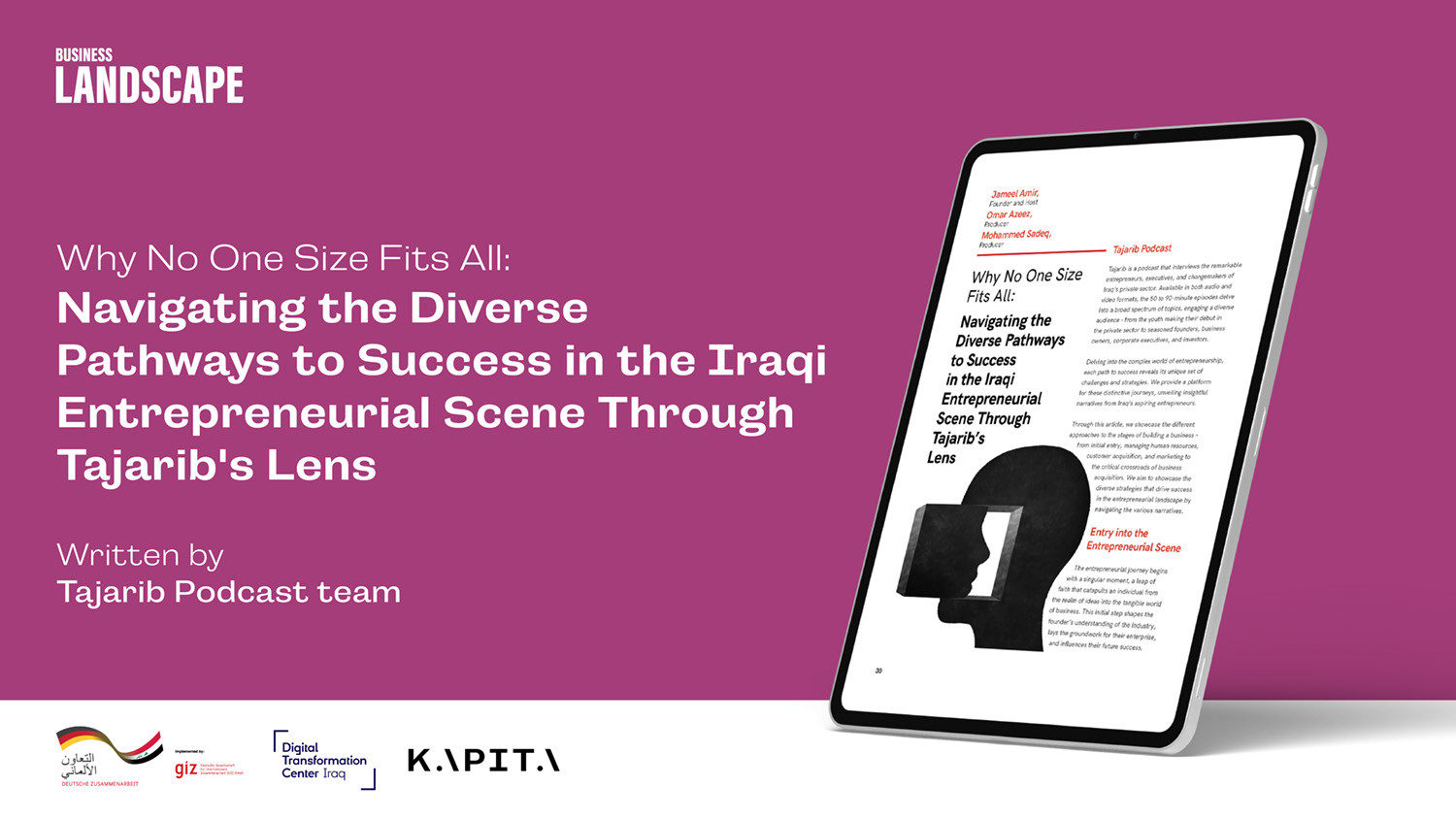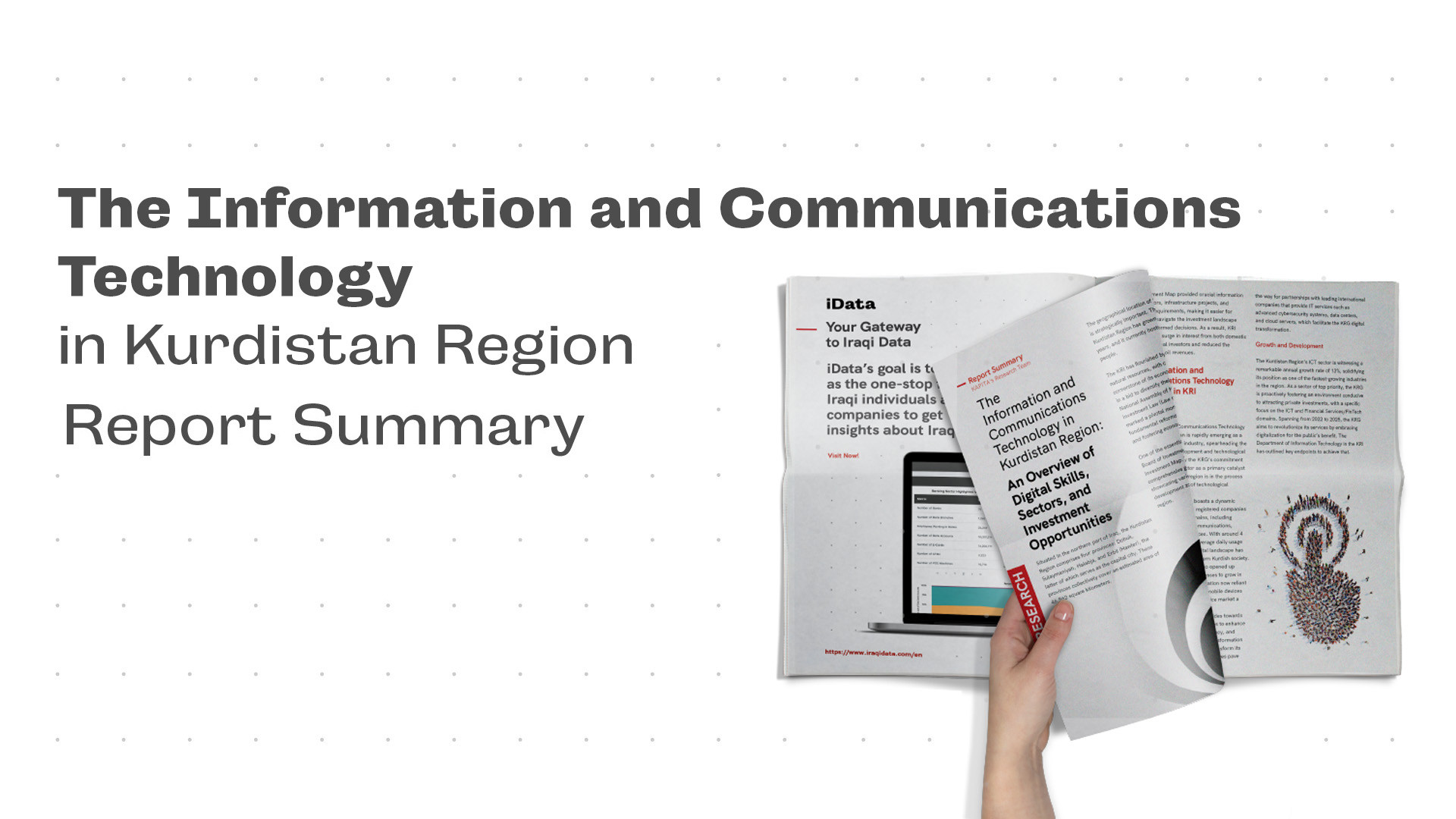Why No One Size Fits All: Navigating the Diverse Pathways to Success in the Iraqi Entrepreneurial Scene Through Tajarib's Lens
Jameel Amir, Founder and Host
Omar Azeez, Producer
Mohammed Sadeq, Producer
Tajarib Podcast
Tajarib is a podcast that interviews the remarkable entrepreneurs, executives, and changemakers of Iraq’s private sector. Available in both audio and video formats, the 50 to 90-minute episodes delve into a broad spectrum of topics, engaging a diverse audience - from the youth making their debut in the private sector to seasoned founders, business owners, corporate executives, and investors.
Delving into the complex world of entrepreneurship, each path to success reveals its unique set of challenges and strategies. We provide a platform for these distinctive journeys, unveiling insightful narratives from Iraq's aspiring entrepreneurs.
Through this article, we showcase the different approaches to the stages of building a business – from initial entry, managing human resources, customer acquisition, and marketing to the critical crossroads of business acquisition. We aim to showcase the diverse strategies that drive success in the entrepreneurial landscape by navigating the various narratives.
Entry into the Entrepreneurial Scene
The entrepreneurial journey begins with a singular moment, a leap of faith that catapults an individual from the realm of ideas into the tangible world of business. This initial step shapes the founder's understanding of the industry, lays the groundwork for their enterprise, and influences their future success. How entrepreneurs make this leap, and the insights they draw from their experiences, are as varied as the businesses they create.
Amer Salih of iQ Cars, an online car marketplace, for instance, drove into the world of automobiles after moving from Sweden to Iraq. By spending time at car dealerships and engaging with customers, he observed a significant issue that formed the basis of his venture. His story speaks to the importance of hands-on experience in understanding an industry's complexities and identifying opportunities for innovation.
“I came to Iraq in 2017 and started working for Toyota’s local provider ever since, getting familiar with automotives and their intricacies. As I spent time in car dealerships and frequently met with customers, I noticed a problem with customers looking to buy a car.”
In a contrasting path, Azad Hasan of Eduba, a learning management system for schools, ventured into entrepreneurship from an academic background. The lure of creating his own venture and the independence it promised led him to explore the edtech sector, a field different from his expertise. His journey reveals how curiosity and the will to solve problems can spur entrepreneurs into unfamiliar territories, creating innovative businesses.
“I had mostly been involved in academia, but the idea of opening my own venture has always been present in my mind. I liked the freedom it provided and the independence it offered me in contrast to having one stream of income not under my control. This is when I scouted for problems and found one present in the edtech sector.”
Marwan Ahmed, currently the VP of Commercial Development and People at Miswag, Iraq's leading e-commerce platform, set foot into the entrepreneurial world through a rather unconventional route. Instead of banking on prior industry experience or academic pursuits, his entry into this space was sparked by a fascination with the vibrant startup culture he encountered during an event.
“When I entered Startup Weekend, I reflected on the contrast between how the environment was there compared to what I was used to at the Ministry of Higher Education with respect to things like titles and bureaucracy, from that moment, I was hooked."
Basima Abdulrahman, the founder of KESK, a green solutions company, initiated her entrepreneurial journey in response to her growing discontent with her government job. Rather than seeking comfort in the security of her position, she recognized the stagnation in her professional growth and sought new opportunities.
“Working for the government showed me that this was not a place where I felt I belonged, I did not feel any sense of self-development. After my first year, I knew I needed to leave, which is why I pursued my Master's."
These distinct entrepreneurial journeys illustrate that a successful entry into the business world hinges not just on expertise, but on the ability to identify problems and innovate solutions. Whether through direct industry experience, an exploratory dive into a new field, a fresh contrast to one’s old workplace, or even discontent with it, Amir, Azad, Marwan, and Basima all tapped into their unique perspectives and resourcefulness to create value in their respective industries. Their stories underscore the myriad pathways into entrepreneurship, illustrating how diverse experiences and a problem-solving mindset form the foundation of successful ventures.
Customer Acquisition
Next, we delve into the strategic challenge of acquiring customers, a crucial task that can profoundly shape a business's growth trajectory. Winning new customers is like setting the first building blocks for a company, shaping its market presence, and establishing its brand. Whether a business operates in a well-established market or is pioneering new trends, its approach to customer acquisition can be a significant determinant of its success.
Mohammed Al-Samarraie from Crazy Town, a creative agency, is a testament to brand reputation's power in attracting customers. In his experience, a robust brand name can be so compelling that it flips the traditional model, with customers initiating the contact. This is an example of inbound marketing, where a company's strong reputation draws in prospective customers, reducing the need for outbound efforts.
“Most of our clients now actually are the ones that start communication by reaching out to us, especially since we have established our brand and name in the market. Our team can barely keep up with the demand nowadays, so we have to decline many clients asking us to work with them.”
In contrast, Rawaa Alhaider, Managing Director at Sagerlabs, an influencer marketing agency, emphasizes the importance of proactive outreach when operating in a developing trend like influencer marketing. This suggests the necessity for businesses in newer industries to put in extra effort, actively seeking out prospective clients and pitching their services to establish themselves in the market.
“We reach out to most of our clients. Influencer marketing is a newer trend globally. Hence we pitch to global, regional, and local brands to educate them about this powerful tool. We also explain to global brands the influencer marketing scene in Iraq to provide them with a comprehensive picture that will enable them to obtain a good return on investments.”
Marketing
Our conversation then steers towards marketing, an indispensable lifeline that connects a business with its potential customers. This strategic aspect can serve as the vehicle that propels an innovative idea into the marketplace, amplifying its presence and carving out its niche. In essence, marketing is the voice of a business, dictating how it presents itself to the world, how it communicates its value proposition, and how it builds lasting relationships with its customers.
Mustafa Alwan, founder of Kawenter, an application that helps travelers of all nationalities get visas to their destinations faster and easier, embodies one perspective, believing that a robust product stands as its best marketing tool. He suggests that word of mouth and customer satisfaction can organically promote a brand, eliminating the need for a substantial marketing budget. It is a testament to the power of a product that meets market demand, resonating so strongly with its audience that they become its most effective promoters.
“We have not spent a dollar on marketing. We believe the product we present markets itself and are confident in our customers’ word of mouth based on their good experience. Additionally, we produce a lot of content that boosts our rankings in search engines, which substitutes for any paid advertising.”
In stark contrast, Ammar Ameen of Miswag, an e-commerce platform, advocates for a more active marketing approach. He emphasizes the role of aggressive marketing campaigns, not just for attracting customers but also for shaping their shopping behaviors and keeping them engaged. This perspective underscores the potential of marketing as a change agent, capable of guiding customers towards new experiences and fostering long-term relationships.
“Marketing is a vital part of Miswag. The only way to introduce people to a new way of shopping is to launch aggressive marketing campaigns to acquire them while also spending on discounts to keep them engaged. This pays off eventually as behavior is established with the customer.”
The balance between a business's unique value proposition and its marketing strategy often depends on what sets it apart in the industry. A distinct product or technological innovation can often market itself, leading to organic customer interest and potentially reducing the need for extensive marketing campaigns. Conversely, businesses creating an overall novel experience may find more value in investing heavily in marketing to introduce new concepts, reshape consumer behavior, and maintain engagement. However, this isn't a prescriptive rule, but a guideline. Each business, in its uniqueness, must navigate its own path, factoring in its specific market dynamics and entrepreneurial approach to strike an optimal balance between innovation and marketing investment.
Human Resources
Human resource management is a critical component in any business, shaping the company's culture, efficiency, and overall success. The approach to building a team and managing employees varies greatly depending on the nature of the business, its operational demands, and the leader's philosophies. These differing strategies often reflect the diversity and complexity of entrepreneurship.
Zaid Al-Khafaji of Iraqi Cinema, the country’s biggest cinema chain, highlights the value of a merit-based hiring process, particularly in a business with technical operations and frequent changes. His approach to reviewing applications, conducting interviews, and providing rigorous training indicates a firm belief in hiring based on qualifications and developing talent through structured learning.
“When we look for new people, we open applications and read CVs, based on which we invite individuals to interviews. The people we select then undergo a rigorous training program conducted by our managers, who are experts in the operational part of the cinemas. I sought to hire by recommendation or family connection at times, but most of them proved to be lazy and unmotivated.”
On the other hand, Ghaith Al-Awsi of Ghaith Gym, the country’s biggest gym chain, presents a different perspective, favoring family relationships and personal passion in managing his branches. His strategy underlines the role of trust and dedication in a business where the operations remain largely constant.
“Most of the branch managers you see are relatives. My mother actually manages our women's branches, and my cousin manages the ones in Rasafa. I can hardly entrust anyone else with this. You need to have passion and care, to do good work. When I notice mistakes, my blood boils. You will not have that kind of care unless it is someone within your family.”
There is no universally applicable strategy for human resource management. Businesses with varying demands and operational landscapes require tailored approaches. Each method holds merit, whether it is a merit-based hiring process in a dynamic, technical environment or trust-based relationships in a stable, consistent operation.
Mergers & Acquisitions
Finally, we arrive at the crossroads of business acquisition, often a turning point in an entrepreneur’s journey in profound ways. This pivotal moment presents a unique blend of challenges and opportunities, often marking a watershed moment in a company's trajectory. Acquisitions can catapult a company into a new echelon of growth, enabling it to tap into the acquiring company's resources, experience, and networks, as Moe Alkhafaji of Pure Platform, an e-commerce platform allowing Iraqis to purchase and ship products from abroad, can attest.
“We chose ISC to acquire the license for Pure Platform’s operations in Iraq because we saw the potential for our brand to grow and reach more people under this partnership. Utilizing their strategic advantages, the already existing wide adoption of their products, and their knowledge and connections to the market. In addition, this acquisition has given us the opportunity to shift our focus to augmenting our technology portfolio and focus more on global expansion.”
Yet, they can also limit a company's autonomy and future prospects, a risk that Rusul Al-Janabi of Turquaz, a cosmetics brand, was unwilling to take.
“Multiple brands, both domestic and regional, have offered to acquire our businesses. I see no value compared to my ownership of the business because we believe we understand the market best, and it still has massive space that can be capitalized on.”
This stage of the journey underlines the nuanced considerations that come into play when contemplating an acquisition. The nature of the business, its place within the industry, the potential benefits and drawbacks of merging with another entity – all these factors come into sharp focus. While tech-based businesses may find more value in being acquired due to conglomerates' vast resources, others operating in untapped markets may resist such a move to maintain control over potential future growth.
As we navigate these unique entrepreneurial journeys, the notion of a universal blueprint for success dissolves, replaced by a rich tapestry of different strategies and viewpoints. This piece seeks to weave together these distinct narratives, revealing how each industry carves its own path through the challenges and opportunities of business. Whether it's the genesis of an idea, the complexities of human resources, the strategies of customer acquisition, the role of marketing, or the critical decisions around acquisitions, it becomes evident that there is truly no "one size fits all" approach in the world of entrepreneurship.






